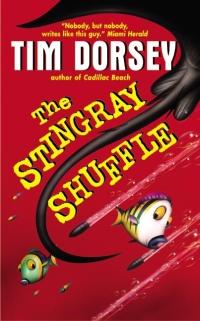 CRUEL SUMMER |
 Fall headfirst into July’s hottest stories—danger, desire, and happily-ever-afters await. |

Purchase
HarperCollins Mystery Excerpt of The Stingray Shuffle by Tim DorseyThe race to invent the first mechanical orange harvester was on. Dreams and designs for a mechanized citrus picker had been bandied about since the 1940s. But back then, it was science fiction stuff. Anyone who seriously thought it could be done was a laughing-stock. Near the turn of the millennium, Florida's postcard orange groves had exploded into a six-billion-dollar-a-year industry. Meanwhile, technology had marched. Nobody was laughing anymore. A functional harvester seemed just around the corner. The state's top citrus barons were now so rich that they had almost everything they wanted. They were unhappy. They wanted to be as rich as oil people. A mechanical picker would do that. Research teams from various nations labored at a feverish pace. Work proceeded in secret, along several different lines. The Swedes were considered to have the lead, advancing the spike-and-drum technique. The Germans placed their bets on hundreds of mechanical arms with spring- action picking fingers. The French used a shake-and-catch design with hydraulic trunk-grabber and retractable manganese skirt. The Japanese were working on something called the Centipede, which nobody knew anything about. All four teams soon had models up and running. That was the easy part. The last big hurdle was efficiency. Every prototype up to now had either left too many oranges on the tree or squashed too much in the process. They had long since mastered the proverbial low-hanging fruit. The real test now was clean canopy penetration. The barons set a tolerance standard of ninety-five percent. The teams redoubled their efforts, improving performance, everyone getting closer. These were exciting times. In January, the Japanese were rumored to have caught the Swedes. Competition became brutal. Engineers went without sleep, safety steps eliminated. Hammering could be heard from the German lab late into the night. The French argued. It was anyone's ball game. Then, on a sunny spring day in 1997, word went out like a cannon shot. A prototype was ready. Dozens of limos quietly converged on a remote grove near the center of the state. Nothing but orange trees in all directions. There was a VIP tent, paddle fans, champagne on ice. Just outside the tent, at the edge of the trees, a huge object sat under a white sheet. The German team approached the podium. Ludwig, head of design, leaned to the microphone. "Behold! Der Shleimerhocken GroveMaster Z500." Someone yanked the sheet, which flew off the device and fluttered to the ground. The audience gasped. A large, intricate cylinder imbedded with innumerable jointed metal arms and razor claws fanning in all directions, the gene splice of a carnival ride and Edward Scissorhands. A German flag on the side. The anticipation was unbearable. Ludwig walked to the GroveMaster, dramatically throwing a switch on the side, and it fell over, crushing him. The Germans had a drawing board, and they went back to it. Work continued tirelessly. Various models and upgrades rolled out. Limos driving into the groves every few months, the barons increasingly bitter, the parade of failures reminiscent of newsreel footage from the early days of aviation -- the plane with the collapsing stack of eight wings, the bouncing helicopter-car, the man in bat wings jumping off a suspension bridge and flying like an anvil, the guy with ice skates and a rocket pack, who had to be extinguished with snowballs. Word leaked out, bad press. Testing was moved to Clermont, for historic symbolism. The demonstration site was in the shadow of the world-famous Citrus Tower, built in 1955 in the rich-soiled, rolling grovelands where it had all started. At least they used to be grovelands. Most of it had been bulldozed for sprawling developments of identical homes and screened-in pools built on top of each other. It was enough to make a baron cry. They needed a harvester now! The French were next. "Gentlemen -- I give you zee Terminator." The sheet flew off. A War of the Worlds contraption stood on spider legs. A man named Jacques picked up a radio control box and pressed a button. Yellow lights that looked like eyes came on. The device began chugging. Smoke puffed out a chimney. Jacques turned a dial. The machine chugged faster, springing on the spider legs. He turned the dial some more. The legs started clomping up and down, slowly at first, then at a brisk, running-in-place clip. Jacques moved the joystick on his box. The device began running. The wrong way. It ripped up the spectator tent, flattening chairs and upending the punch bowl. Barons and politicians scattered through the groves, the Terminator running amok. It cornered one of the barons against a Cyclone fence and seized him around the waist with the hydraulic trunk-grabber, lifting him off the ground and squeezing until he squirted stuff. Then it shook the limp body a few times before dropping it in the self-cleaning metal skirt. Talk about a setback. But there were others. A new and improved GroveMaster exploded in the German lab, unpleasant news photos of men fleeing in burning lab coats. A militant migrant group dynamited the Swedish lab. Then the French blew up their own lab with cooking sherry. But so close! Can't stop now. Work continued through the winter with smudge pots, icicles on the trees. Toes had to be amputated. Finally, spring again. The Japanese were ready. The barons had decided to move to the top of the Citrus Tower and watch through binoculars. "Gentlemen -- the Centipede!" The sheet came off. The Centipede ripped down three rows of trees, then left the grove and took off in the direction of town. The barons' binoculars swung around to the west side of the tower, toward the distant screams. The resulting public outcry got the state into the act. The foreign labs were closed down and a domestic contractor brought in. The contractor was well connected with state government. It had previously only stamped out interstate highway signs at twenty thousand dollars each but was able to convince officials that the technology was interchangeable. An appointed board quickly approved the no-bid contract. Work resumed. The accidents stopped but not progress. It went backward. Picking efficiency dropped below sixty percent for the first time since 1980. Everything got behind schedule. Cost overruns, redundant parts, the device mutating into unworkable configurations without apparent design or goal. But political contributions were up, and the Florida Robotic Harvester program was considered a smashing success. The barons were furious. They called in their own markers, and the state met behind closed doors to strike a compromise. It would offer the contractor an incentive. A harvester would be worth tens of millions of dollars a year to a private inventor. If it was made by a contractor working for the taxpayers, however, those rights reverted to the state. The deal: develop a functional prototype by the fall and keep all proceeds for the first three years. It was a fifty-million-dollar carrot. Everyone agreed. Excerpt from The Stingray Shuffle by Tim Dorsey |
|
| |||
|
||||



 © 2003-2025
© 2003-2025